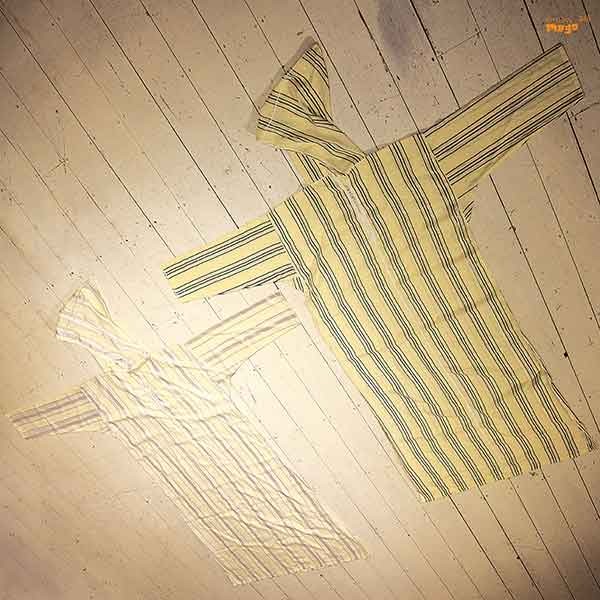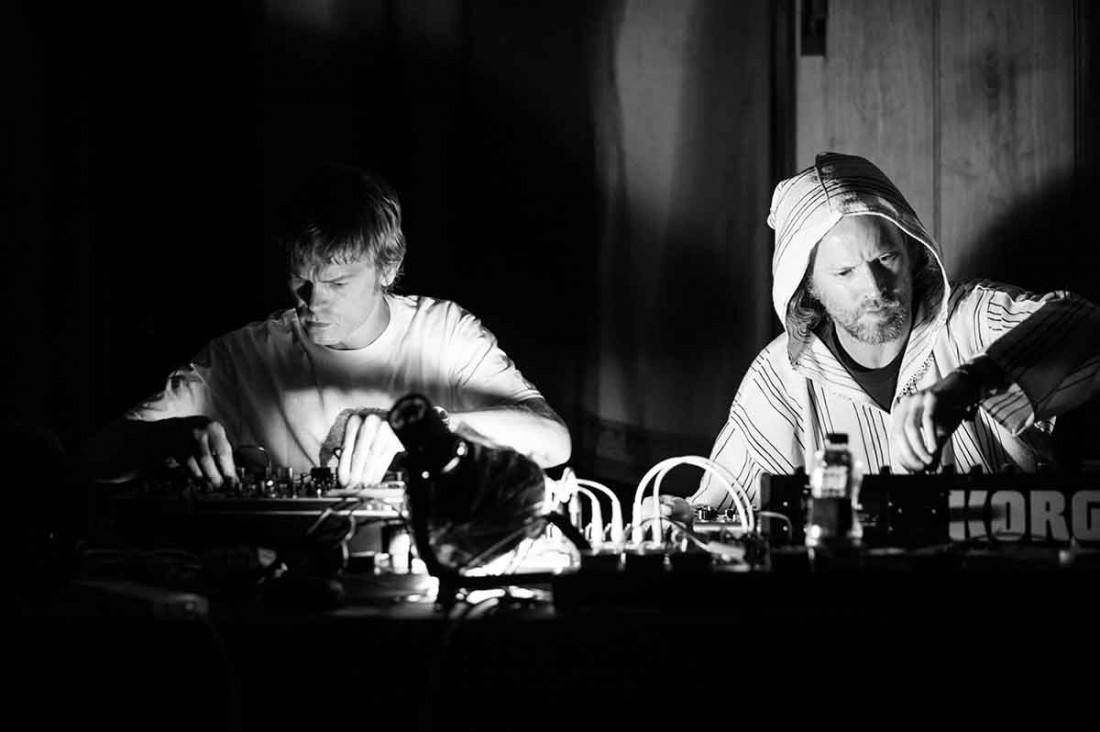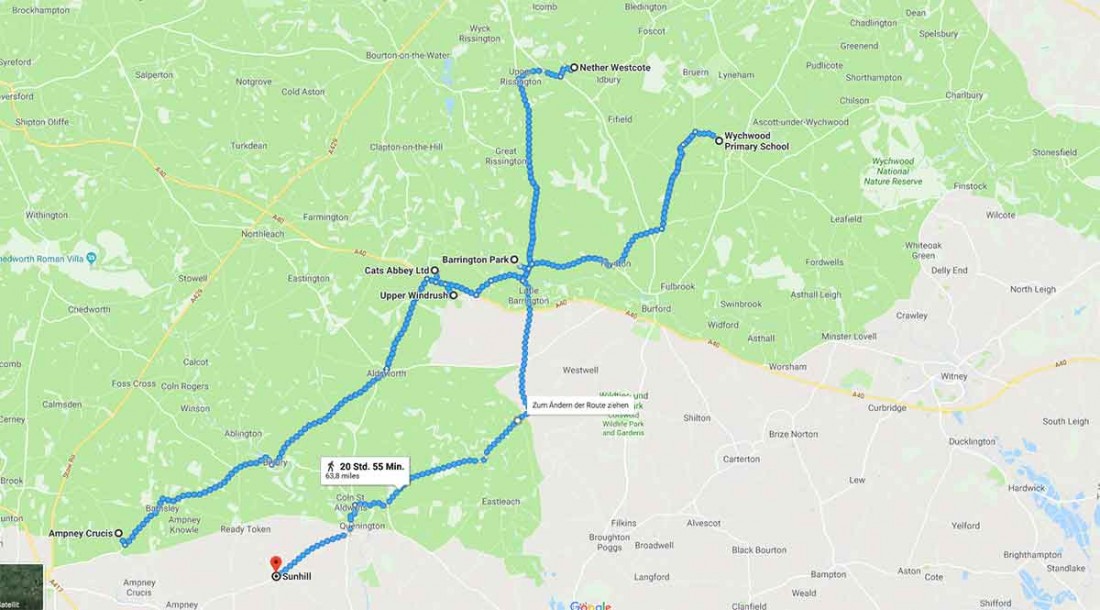A journey into the unknown
It all starts with a slowly swelling wall of drone, magically disconnecting the listener from the usual time-space-continuum. It’s an experience so confusing, I find myself asking: have I been listening to this music for a few seconds or an hour already?
Right, that’s so weird. So, what’s happening? While I disappear deeper and deeper into this inner monologue the sound intensifies, getting louder and more compressed.
The track I am listening to is „Wychwood“, the first of six tracks on “Modern Methods For Ancient Rituals“, the debut album of The Transcendence Orchestra.
In contrast to the listening experience provided by “Modern Methods For Ancient Rituals“, the Skype call (just voice, no faces) with Anthony Child and Daniel Bean, the two gentlemen behind The Transcendence Orchestra, is a rather more Earthly experience. The connection is so bad that I have huge difficulties understanding who is actually speaking at times. With a hint of gallows humor I almost wonder if this sound experience is The Transcendence Orchestra experimenting with our modern communications technology to develop a devilish new type of reverb for their next record. Certainly doomed-Skype would be a change from their regular arsenal of Buchla Music Easel, harmonium, shruti box, bass guitar, hurdy gurdy, sym- phonie, glockenspiel, hand bell, Electro Harmonix 45000, Strymon Blue Sky, Strymon DIG, and the trustry Roland RE 101 Space Echo.
But then again, things do not happen without purpose in this universe, so maybe the communication breakdown is usefully focusing our eyes and ears on their music as the real medium of exchange. As I ponder this idea, “Upper Windrush“ is passing the twelth minute mark, provoking memories of Gas, the majestetic Ambient-Drone-Pop project of Wolfgang Voigt. This comparison only holds for this track, as the other cuts on “Modern Methods For Ancient Rituals“ are less ethereal and loopy, much more bodily demanding in their effects on mind and torso, structured like mantras.
So where to begin in this jungle of sounds and words? I am interested to learn why Anthony Child and Daniel Bean create music and why together? They first met a long time ago through the Bleep43 parties Bean was involved in and for which Child, who you might know through his techno imprint Surgeon, the British Murder Boys, his project with Regis, and through his collaborations with Lady Starlight and Speedy J, was a regular booking. Soon they realized they shared a common fascination for hypnotic sound elements, among other things.
„To transform ourselves and other people“, is how Daniel Bean answers my question. It’s quite surprising, a freethinking statement, while Anthony Child takes a more evasive direction: „You could also ask me: why do you breathe? Why do you eat food? It‘s not like I really decided to produce music, it feels more likely that I had no choice.“
No choice hits the nail pretty much on the head, as there is no easy way out of “Modern Methods For Ancient Rituals“. As much as the album could be filed under ‚ambient‘ music and be used for esoteric matters, it is the total opposite as those six tracks have the potential to hit you hard. They trigger your senses and make you ask both inner and outer questions.
Modest as they are, Daniel Bean and Anthony Child refer to the huge inflence other artists have had on their work, mostly those whose art demands their attention to such a degree that they can’t ignore it. The idea is, when the outer (material) world is silenced, the music is able to change the way the listeners feel. They want to open up an extended artistic space for a true journey into the unknown.
 With this ambition in mind, Bean and Child chose an apt album title, “Modern Methods For Ancient Rituals“. It captures their shared interest in exploring the larger spiritual dimensions and at the same time planting a flag for their interest in the way we live now. At its heart, The Transcendence Orchestra has an interest in ancient cultural rituals, but they’re not slaves to past times. The ambition is to give voice to the ancient with contemporary instruments and sounds.
With this ambition in mind, Bean and Child chose an apt album title, “Modern Methods For Ancient Rituals“. It captures their shared interest in exploring the larger spiritual dimensions and at the same time planting a flag for their interest in the way we live now. At its heart, The Transcendence Orchestra has an interest in ancient cultural rituals, but they’re not slaves to past times. The ambition is to give voice to the ancient with contemporary instruments and sounds.
So how do you transcend? In part, they knew the recording process itself had to be a physical adventure and a mind expanding experience, not some home recording effort. So Bean and Child decamped to a cabin in Cats Abbey, a litle village west of Oxford. Leaving aside a few odd breaks for food and sleep, pretty much every second was used to produce music – a musical conversation between the two that would go on for hours. Both remember the week as extraordinarily tiring but at the same time extremely satisfying. Every track came to life quickly and naturally, somehow never a challenge.
„Wychwood“, “Upper Windrush“, “Barrington Park“, “Ampney Crucis“, “Nether Westcote“, “Sun Hill“ – every track on “Modern Methods For Ancient Rituals“ is named after real places in the Cats Abbey neighbourhood. But as much as it would make sense to interpret this as the some album narrative, Daniel Bean and Anthony Child claim that the geographic references to help the listener imagine it’s the soundtrack to a territory. In fact they only took a walk around the area for the first time once the album was done.
In the last few years, New Age music has had something of an appreciative revival. This was a genre deemed untouchable by the cool kids ever since the 80s, and typically just gets filed near ambient music. Yet all of a sudden, meditation music is kinda hip. I asked the duo if they see “Modern Methods For Ancient Rituals“ as a tool for changing consciousness? „We know that our music has the potential to help people do so“, Bean answers, quite restrained. He went on: „You could never control what people do with your music.“ That admit that they love it when people tell them that they get totally absorbed by their sounds and are not able to do anything else than listen intently. But they never take this effect for granted, sweetly feeling it’s still a bit like a miracle to them. „It is so exciting that the people have the patience to listen so our music“, says Anthony. For Daniel there’s a connection between current listening preferences and the ‚chill out‘ rooms of the early 90s scene. Back then it was kinda normal that each club and party hosted both, an ecastic dance floor and a kind of retreat area with music tailored to that purpose. „You could go to these calm places and meditate or whatever you wanted to do there. I am not sure why it has come back, but I am happy about this.“
Asked what to expect from their upcoming performance at Meakusma festival, both Anthony and Daniel pause for a second before pointing out that – like for their last show at Londons Cafe Oto – Paddy Shine, member of the band Gnod and a great improviser, will join them for the Meakusma gig. After another moment of silence Child continues: „We don´t know what‘s gonna happen. Hopefully people are gonna come after the show and´ say: This really fucked my head up – in a good way.“
It is all about the connetions with the audience, Daniel Bean adds. „We want to connect with them while they get lost in our music. We are possessed by it – and if they become possessed too the Orchestra grows…“
The Transcendence Orchestra will perform at this year‘s Meakusma festival in Eupen.
















